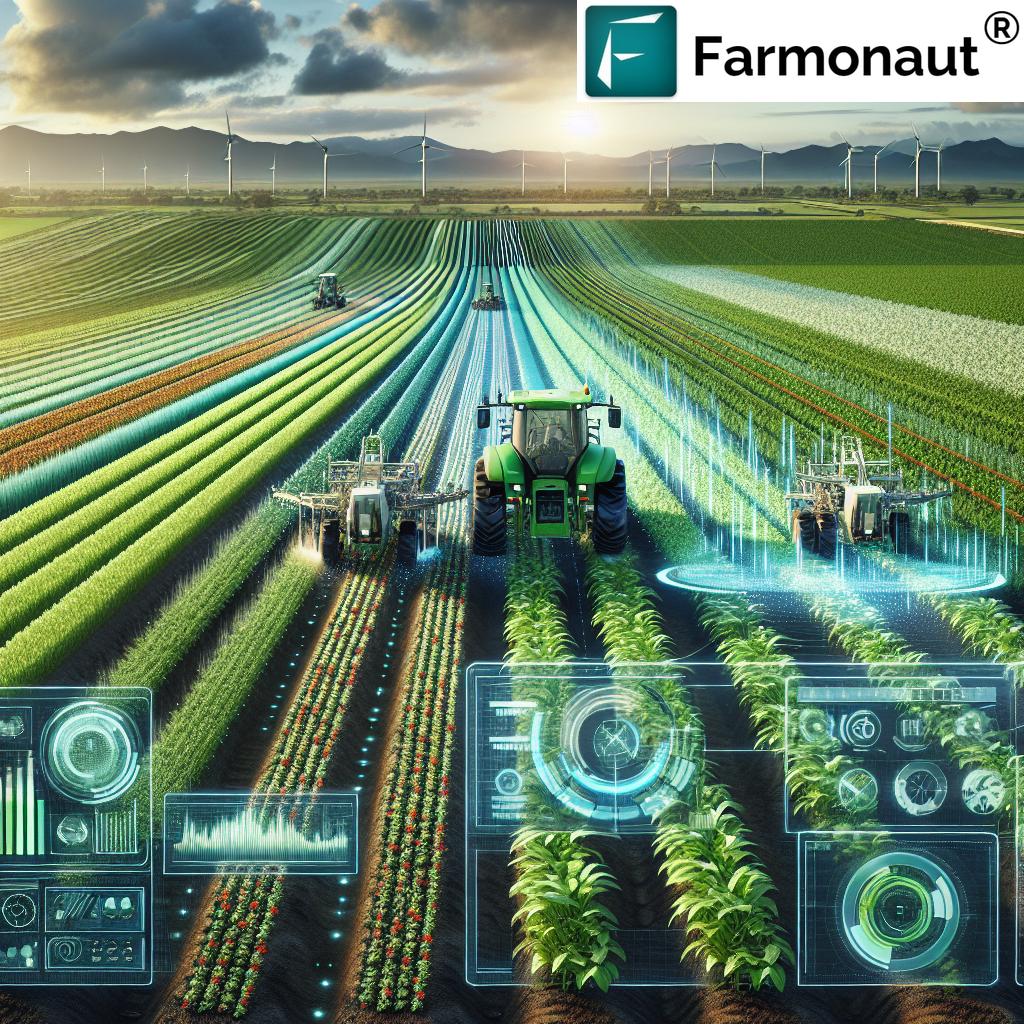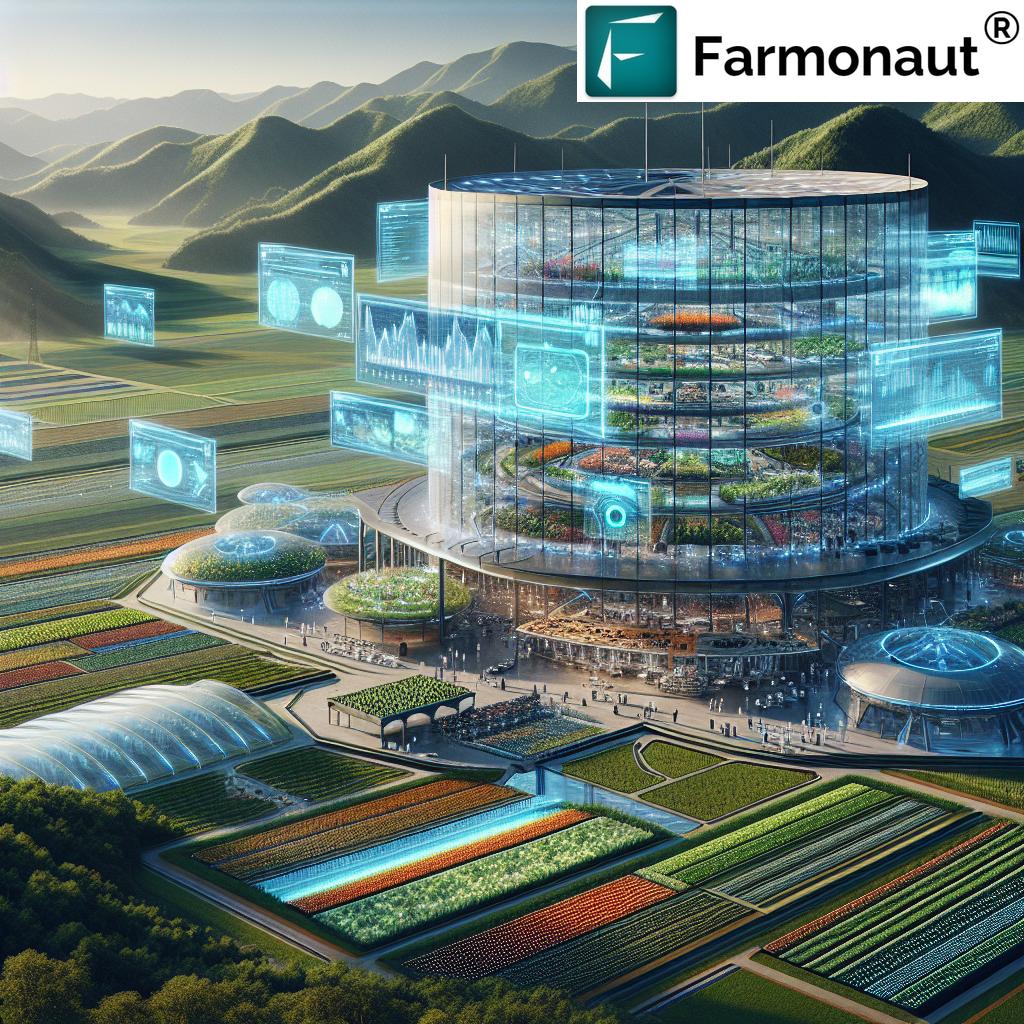Revolutionizing Agriculture: How Precision Farming and Agritech Innovation Are Transforming Global Trade and Productivity
“Precision farming can increase crop yields by up to 30% while reducing water usage by 50%.”
In the ever-evolving landscape of global trade and agricultural productivity, we are witnessing a profound transformation driven by precision farming technology and agricultural automation. As developing countries face new challenges in maintaining their competitive edge, the integration of agritech innovations and smart farming solutions is becoming increasingly crucial. In this comprehensive exploration, we’ll delve into how these technological advancements are reshaping the agricultural sector, impacting global trade dynamics, and offering new opportunities for nations traditionally reliant on low-skilled exports.
The Changing Face of Global Agriculture
The agricultural sector has long been a cornerstone of economic development for many nations, particularly those in the developing world. However, the traditional model of leveraging low-cost labor for export-oriented manufacturing is facing unprecedented challenges. Automation, intensified global competition, and shifting trade policies are forcing countries to reevaluate their strategies for economic growth and agricultural development.

As we navigate these changes, precision farming technology emerges as a beacon of hope, offering the potential to enhance agricultural productivity, sustainability, and competitiveness on the global stage. Let’s explore how these innovations are reshaping the agricultural landscape:
- Satellite-Based Monitoring: Advanced satellite imagery provides real-time insights into crop health, soil moisture, and other critical metrics. This technology, exemplified by platforms like Farmonaut, enables farmers to make data-driven decisions, optimizing resource usage and crop yields.
- IoT and Smart Sensors: The Internet of Things (IoT) has revolutionized farm management by providing granular data on soil conditions, weather patterns, and crop growth. These smart sensors help in precision irrigation, fertilization, and pest control.
- AI and Machine Learning: Artificial Intelligence algorithms analyze vast amounts of agricultural data to provide predictive insights, helping farmers anticipate challenges and optimize their operations.
- Drone Technology: Unmanned aerial vehicles (UAVs) offer a cost-effective solution for crop monitoring, spraying, and mapping, especially useful for small to medium-sized farms in developing countries.
The Impact on Global Trade and Productivity
The adoption of precision farming technology and agricultural automation is having a profound impact on global trade dynamics and productivity levels. Here’s how:
- Enhanced Crop Yields: By optimizing inputs and farming practices, precision agriculture can significantly increase crop yields, allowing developing countries to boost their agricultural exports.
- Improved Quality Control: Advanced monitoring and management systems ensure higher quality produce, meeting stringent international standards and opening up new export markets.
- Resource Efficiency: Smart farming solutions reduce water usage, minimize chemical inputs, and optimize energy consumption, making agricultural practices more sustainable and cost-effective.
- Diversification of Exports: With improved productivity and quality, developing countries can diversify their agricultural exports beyond traditional commodities, tapping into high-value markets.
Overcoming Challenges in Developing Countries
While the potential benefits of agritech innovation are immense, developing countries face unique challenges in implementing these technologies:
- Infrastructure Limitations: Many rural areas lack the necessary digital infrastructure to support advanced farming technologies. Investments in connectivity and power supply are crucial.
- Skills Gap: There’s a pressing need for training and education to equip farmers and agricultural workers with the skills to utilize precision farming tools effectively.
- Financial Constraints: The initial investment required for precision farming equipment can be prohibitive for small-scale farmers. Innovative financing models and government support are essential.
- Cultural Resistance: Traditional farming practices are deeply ingrained in many communities. Overcoming resistance to change requires demonstration of tangible benefits and cultural sensitivity.
To address these challenges, collaborative efforts between governments, private sector entities, and international organizations are crucial. Initiatives like Farmonaut’s affordable satellite-based farm management solutions are making precision agriculture more accessible to farmers in developing countries.

The Role of Digital Agriculture Services
Digital agriculture services are playing a pivotal role in bridging the gap between advanced technologies and small-scale farmers in developing countries. These services encompass a range of solutions, including:
- Mobile Apps: Smartphone applications provide farmers with weather forecasts, market prices, and agricultural advice. Farmonaut’s Android app and iOS app are prime examples of how mobile technology can bring precision farming to the fingertips of farmers.
- AI-Powered Advisory Systems: Artificial Intelligence algorithms analyze farm-specific data to provide personalized recommendations for crop management, pest control, and resource optimization.
- Blockchain for Traceability: Blockchain technology ensures transparency and traceability in agricultural supply chains, enhancing food safety and building consumer trust.
- E-commerce Platforms: Digital marketplaces connect farmers directly with buyers, reducing intermediaries and improving profit margins for producers.
“Agritech innovations have the potential to create over 1 million new high-skilled jobs in developing countries by 2030.”
Sustainable Agriculture Practices and Global Trade
As the world grapples with climate change and environmental degradation, sustainable agriculture practices are becoming increasingly important in global trade negotiations. Precision farming technology and agritech innovations are at the forefront of this sustainability push:
- Reduced Environmental Impact: By optimizing resource use, precision farming significantly reduces the environmental footprint of agricultural activities.
- Carbon Sequestration: Advanced soil management techniques, enabled by precision agriculture, can enhance carbon sequestration, potentially opening up new revenue streams through carbon credits.
- Biodiversity Conservation: Smart farming practices help preserve biodiversity by minimizing habitat destruction and reducing chemical runoff.
- Water Conservation: Precision irrigation systems dramatically reduce water waste, a critical factor in water-stressed regions.
These sustainable practices not only benefit the environment but also enhance the competitiveness of agricultural exports from developing countries in global markets increasingly concerned with sustainability.
Workforce Development and Skill Enhancement
The transition to precision farming and agritech-driven agriculture necessitates a shift in workforce skills. Developing countries must invest in education and training programs to prepare their agricultural workforce for the future:
- Technical Skills: Training in data analysis, GPS technology, and agricultural software applications is essential.
- Digital Literacy: Basic digital skills are becoming a prerequisite for modern farming practices.
- Entrepreneurship: Encouraging agri-entrepreneurship can drive innovation and create new opportunities in rural areas.
- Continuous Learning: As technology evolves rapidly, fostering a culture of lifelong learning in the agricultural sector is crucial.
By focusing on workforce development, developing countries can create a pool of skilled agricultural professionals capable of driving innovation and productivity in the sector.
The Future of Global Agricultural Trade
As we look to the future, the integration of precision farming technology and agritech innovation is set to reshape global agricultural trade in several ways:
- Shift in Competitive Advantage: Countries that successfully adopt and scale precision farming technologies will gain a significant edge in global markets.
- New Trade Patterns: Improved productivity and diversification of crops may lead to the emergence of new trade routes and partnerships.
- Value-Added Services: Beyond raw agricultural products, there will be growing opportunities in exporting agricultural technology and knowledge services.
- Data-Driven Trade: Big data and AI will play an increasingly important role in predicting market trends and optimizing trade flows.
For developing countries, embracing these changes presents an opportunity to leapfrog traditional development stages and establish themselves as leaders in modern, sustainable agriculture.
Precision Farming Technologies and Their Impact on Agricultural Productivity
| Technology | Description | Estimated Productivity Increase | Implementation Challenges |
|---|---|---|---|
| Satellite Imagery and Remote Sensing | Provides real-time data on crop health, soil moisture, and field conditions | 15-25% | High initial costs, data interpretation skills |
| IoT Sensors and Smart Irrigation | Monitors soil conditions and automates irrigation based on real-time data | 20-30% | Connectivity issues, maintenance of sensors |
| Drone-based Crop Monitoring | Offers high-resolution imagery for precise crop management | 10-20% | Regulatory hurdles, operator training |
| AI-powered Yield Prediction | Uses machine learning to forecast yields and optimize harvesting | 15-25% | Data quality, algorithm accuracy |
| Automated Farm Equipment | Self-driving tractors and robotic harvesters for efficient field operations | 25-35% | High investment costs, technical expertise for operation |
Farmonaut: Empowering Farmers with Precision Agriculture
In the realm of agritech innovation, Farmonaut stands out as a pioneer in making precision agriculture accessible and affordable for farmers worldwide. By leveraging advanced satellite technology and artificial intelligence, Farmonaut provides a comprehensive suite of tools that address various challenges in modern agriculture:
- Satellite-Based Crop Health Monitoring: Farmonaut’s platform uses multispectral satellite imagery to provide real-time insights into crop health, helping farmers make informed decisions about irrigation, fertilization, and pest management.
- AI-Powered Advisory System: The Jeevn AI system offers personalized farm management advice, weather forecasts, and expert crop strategies, enhancing farm productivity and efficiency.
- Blockchain-Based Traceability: Farmonaut’s blockchain solutions ensure transparency in agricultural supply chains, building trust and reducing fraud.
- Resource Management Tools: From fleet management to carbon footprint tracking, Farmonaut provides comprehensive tools for efficient resource utilization and sustainability.
Farmers, agribusinesses, and government agencies can access Farmonaut’s services through its web application, mobile apps (Android and iOS), or integrate the technology into their existing systems through the Farmonaut API.
Conclusion: Embracing the Agricultural Revolution
The integration of precision farming technology and agritech innovation represents a paradigm shift in global agriculture. For developing countries, this transformation offers a unique opportunity to enhance agricultural productivity, improve sustainability, and strengthen their position in global trade.
By investing in digital infrastructure, workforce development, and supportive policies, nations can harness the power of precision agriculture to drive economic growth and rural development. The future of agriculture lies in smart, data-driven practices that not only increase yields but also promote environmental stewardship and social equity.
As we move forward, collaboration between governments, private sector innovators like Farmonaut, and international organizations will be crucial in ensuring that the benefits of agritech innovation are accessible to all, particularly smallholder farmers in developing countries. By embracing this agricultural revolution, we can work towards a more sustainable, productive, and equitable global food system.
FAQ Section
Q: What is precision farming technology?
A: Precision farming technology refers to a suite of tools and practices that use data-driven insights to optimize agricultural operations. This includes satellite imagery, IoT sensors, AI algorithms, and automated machinery to enhance crop yields, reduce resource waste, and improve overall farm efficiency.
Q: How does agritech innovation benefit developing countries?
A: Agritech innovation helps developing countries by increasing agricultural productivity, improving resource efficiency, enhancing product quality, and opening up new export opportunities. It also promotes sustainable farming practices and can create high-skilled jobs in rural areas.
Q: What are the main challenges in implementing precision farming in developing countries?
A: The main challenges include limited digital infrastructure, lack of technical skills among farmers, high initial investment costs, and cultural resistance to new technologies. Overcoming these requires targeted investments, education programs, and supportive government policies.
Q: How does precision farming contribute to sustainable agriculture?
A: Precision farming contributes to sustainability by optimizing resource use, reducing chemical inputs, minimizing environmental impact, and enhancing soil health. It also helps in water conservation and can play a role in carbon sequestration.
Q: What role do digital agriculture services play in modernizing farming practices?
A: Digital agriculture services provide farmers with access to crucial information, personalized advice, and market connections. They bridge the gap between advanced technologies and small-scale farmers, making precision agriculture more accessible and affordable.
For more information on how Farmonaut is revolutionizing agriculture through precision farming technology, visit our API Developer Docs or explore our mobile applications:
Join us in revolutionizing agriculture and shaping the future of global trade and productivity!







